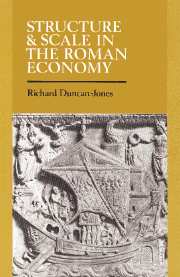Book contents
- Frontmatter
- Contents
- List of figures
- List of tables
- Preface
- List of abbreviations
- Introduction
- PART I TIME AND DISTANCE
- PART II DEMOGRAPHY AND MANPOWER
- PART III AGRARIAN PATTERNS
- 8 Land and landed wealth
- 9 The price of wheat in Roman Egypt
- PART IV THE WORLD OF CITIES
- PART V TAX-PAYMENT AND TAX-ASSESSMENT
- Appendices
- Bibliography
- Index
9 - The price of wheat in Roman Egypt
Published online by Cambridge University Press: 13 October 2009
- Frontmatter
- Contents
- List of figures
- List of tables
- Preface
- List of abbreviations
- Introduction
- PART I TIME AND DISTANCE
- PART II DEMOGRAPHY AND MANPOWER
- PART III AGRARIAN PATTERNS
- 8 Land and landed wealth
- 9 The price of wheat in Roman Egypt
- PART IV THE WORLD OF CITIES
- PART V TAX-PAYMENT AND TAX-ASSESSMENT
- Appendices
- Bibliography
- Index
Summary
Introduction
As the main source of bread, the staple foodstuff of antiquity, wheat has obvious interest for the economic historian. Its central importance has not always been fully recognised. The advertised menu at dinners of plebeian colleges in Italy under the Principate usually consisted of bread and wine. In Egypt, small property-owners who made contracts with their heirs for their own maintenance, asked only for wheat and oil. Apprenticeship and entertainment contracts in Egypt often show the same terms.
The position was similar in the Mediterranean in more recent times. Labourers on a farm in Sicily in the late seventeenth century lived on bread and wine, with small amounts of cheese and oil. Paupers in eighteenth century Languedoc received bread and very small amounts of wine. In Lucania under Mussolini the agricultural poor ate bread and little else. Though a bread diet leads to malnutrition and greatly increases vulnerability to disease, the evidence for its prevalence through long periods of Mediterranean history is relatively clear–cut.
Egyptian evidence is crucially important for the price of bread in the Roman world, though what it refers to (for reasons discussed in section 7) is usually wheat from which bread would be made. Even Roman soldiers received rations in this form, and the warlike emperor Caracalla is said to have endeared himself to his troops by sharing their lot and baking his own bread while in camp.
The Egyptian evidence for wheat prices falls into three categories.
- Type
- Chapter
- Information
- Structure and Scale in the Roman Economy , pp. 143 - 156Publisher: Cambridge University PressPrint publication year: 1990
- 1
- Cited by



